(完整word版)情态动词表推测专项练习题
高考英语情态动词辨析运用练习题20题
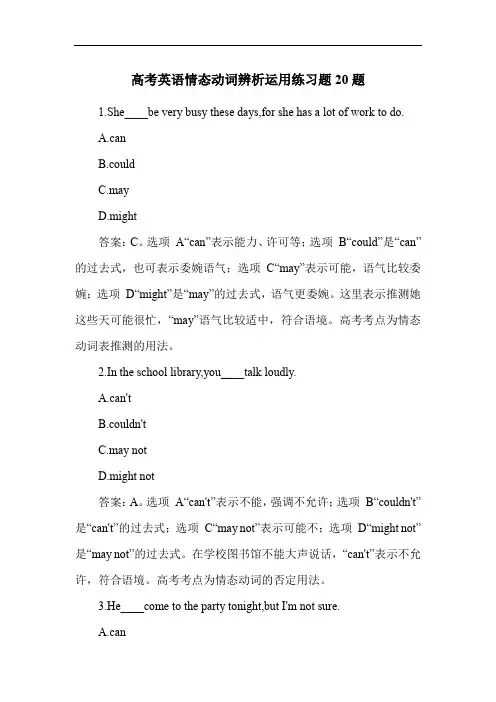
高考英语情态动词辨析运用练习题20题1.She____be very busy these days,for she has a lot of work to do.A.canB.couldC.mayD.might答案:C。
选项A“can”表示能力、许可等;选项B“could”是“can”的过去式,也可表示委婉语气;选项C“may”表示可能,语气比较委婉;选项D“might”是“may”的过去式,语气更委婉。
这里表示推测她这些天可能很忙,“may”语气比较适中,符合语境。
高考考点为情态动词表推测的用法。
2.In the school library,you____talk loudly.A.can'tB.couldn'tC.may notD.might not答案:A。
选项A“can't”表示不能,强调不允许;选项B“couldn't”是“can't”的过去式;选项C“may not”表示可能不;选项D“might not”是“may not”的过去式。
在学校图书馆不能大声说话,“can't”表示不允许,符合语境。
高考考点为情态动词的否定用法。
3.He____come to the party tonight,but I'm not sure.A.canC.mayD.might答案:D。
选项A“can”表示能力、许可等;选项B“could”是“can”的过去式,也可表示委婉语气;选项C“may”表示可能,语气比较委婉;选项D“might”是“may”的过去式,语气更委婉。
这里表示不确定他今晚可能来参加聚会,“might”语气最委婉,符合语境。
高考考点为情态动词表推测的用法。
4.____I borrow your pen?A.CanB.CouldC.MayD.Might答案:C。
选项A“can”表示能力、许可等;选项B“could”是“can”的过去式,也可表示委婉语气;选项C“may”表示请求许可,语气比较委婉;选项D“might”是“may”的过去式,语气更委婉。
【英语】情态动词练习题(word)1
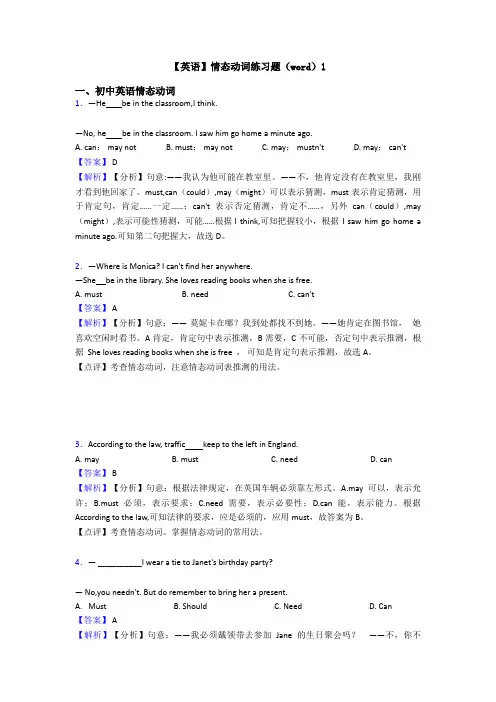
【英语】情态动词练习题(word)1一、初中英语情态动词1.—He be in the classroom,I think.—No, he be in the classroom. I saw him go home a minute ago.A. can; may notB. must; may notC. may; mustn'tD. may; can't 【答案】 D【解析】【分析】句意:——我认为他可能在教室里。
——不,他肯定没有在教室里,我刚才看到他回家了。
must,can(could),may(might)可以表示猜测,must表示肯定猜测,用于肯定句,肯定……一定……;can't表示否定猜测,肯定不……,另外can(could),may (might),表示可能性猜测,可能……根据I think,可知把握较小,根据I saw him go home a minute ago.可知第二句把握大,故选D。
2.—Where is Monica? I can't find her anywhere.—She be in the library. She loves reading books when she is free.A. mustB. needC. can't【答案】 A【解析】【分析】句意:——莫妮卡在哪?我到处都找不到她。
——她肯定在图书馆,她喜欢空闲时看书。
A肯定,肯定句中表示推测,B需要,C不可能,否定句中表示推测,根据 She loves reading books when she is free ,可知是肯定句表示推测,故选A。
【点评】考查情态动词,注意情态动词表推测的用法。
3.According to the law, traffic keep to the left in England.A. mayB. mustC. needD. can【答案】 B【解析】【分析】句意:根据法律规定,在英国车辆必须靠左形式。
情态动词表推测用法总结及专项练习
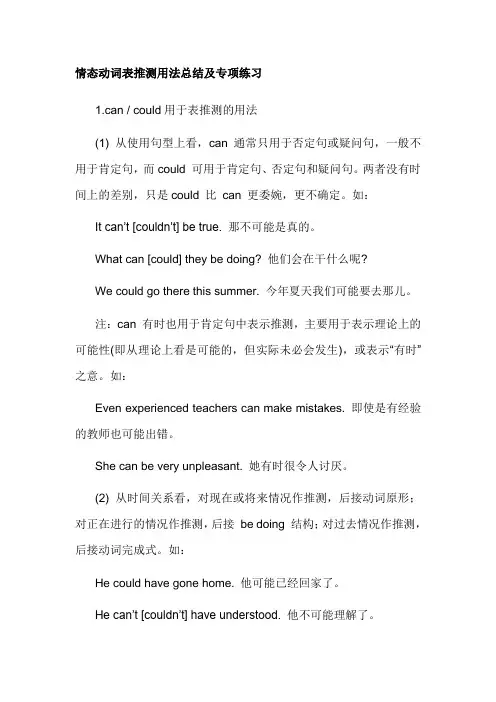
情态动词表推测用法总结及专项练习1.can / could用于表推测的用法(1) 从使用句型上看,can 通常只用于否定句或疑问句,一般不用于肯定句,而could 可用于肯定句、否定句和疑问句。
两者没有时间上的差别,只是could 比can 更委婉,更不确定。
如:It can’t [couldn’t] be true. 那不可能是真的。
What can [could] they be doing? 他们会在干什么呢?We could go there this summer. 今年夏天我们可能要去那儿。
注:can 有时也用于肯定句中表示推测,主要用于表示理论上的可能性(即从理论上看是可能的,但实际未必会发生),或表示“有时”之意。
如:Even experienced teachers can make mistakes. 即使是有经验的教师也可能出错。
She can be very unpleasant. 她有时很令人讨厌。
(2) 从时间关系看,对现在或将来情况作推测,后接动词原形;对正在进行的情况作推测,后接be doing 结构;对过去情况作推测,后接动词完成式。
如:He could have gone home. 他可能已经回家了。
He can’t [couldn’t] have understood. 他不可能理解了。
Why does he know this? Can [Could] someone have told him about it? 他怎么知道? 会是哪个人告诉他了吗?(3) “could+完成式”除表示对过去的推测外,还有以下重要用法:①表示过去没有实现的可能性,常译为“本来可以”。
如:I could have lent you the money.Why didn’t you ask me? 我本来可以借这笔钱给你的。
你为什么不向我提出?②用来委婉地责备某人过去应该做某事而没有去做,常译为“本来应该”。
情态动词表推测专项练习题
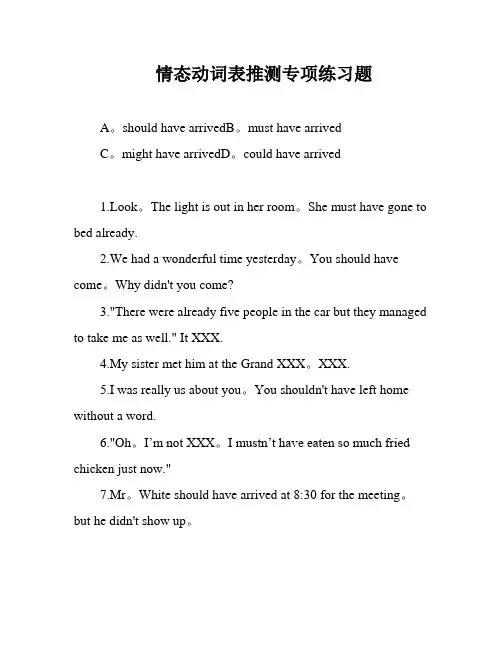
情态动词表推测专项练习题A。
should have arrivedB。
must have arrivedC。
might have arrivedD。
could have arrived1.Look。
The light is out in her room。
She must have gone to bed already.2.We had a wonderful time yesterday。
You should have come。
Why didn't you come?3."There were already five people in the car but they managed to take me as well." It XXX.4.My sister met him at the Grand XXX。
XXX.5.I was really us about you。
You shouldn't have left home without a word.6."Oh。
I’m not XXX。
I mustn’t have eaten so much fried chicken just now."7.Mr。
White should have arrived at 8:30 for the meeting。
but he didn't show up。
1.It seems that the person has already gone to bed。
so the correct answer is "must have gone".2.The speaker had a great time and expected the other person to come as well。
so the correct answer is "should have come".3.XXX because there were too many people in the car。
一.情态动词表推测 有答案
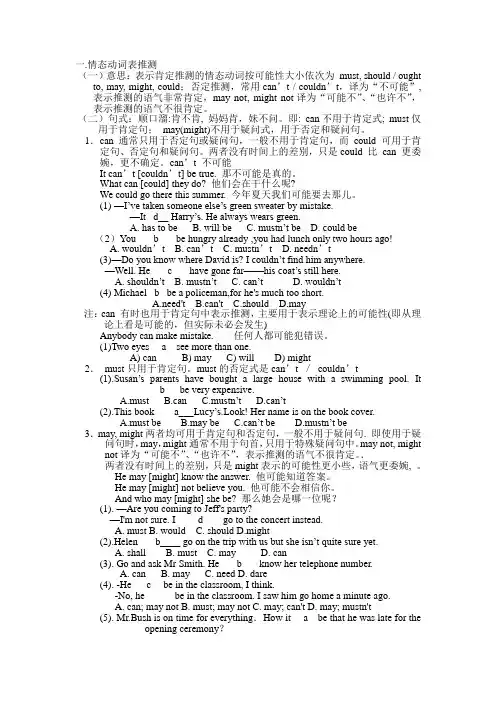
一.情态动词表推测(一)意思:表示肯定推测的情态动词按可能性大小依次为must, should / ought to, may, might, could;否定推测,常用can’t / couldn’t,译为“不可能”,表示推测的语气非常肯定,may not, might not译为“可能不”、“也许不”,表示推测的语气不很肯定。
(二)句式:顺口溜:肯不肯, 妈妈肯,妹不问。
即: can不用于肯定式; must仅用于肯定句;may(might)不用于疑问式,用于否定和疑问句。
1.can 通常只用于否定句或疑问句,一般不用于肯定句,而could 可用于肯定句、否定句和疑问句。
两者没有时间上的差别,只是could 比can 更委婉,更不确定。
can’t 不可能It can’t [couldn’t] be true. 那不可能是真的。
What can [could] they do? 他们会在干什么呢?We could go there this summer. 今年夏天我们可能要去那儿。
(1) —I’ve taken someone else’s green sweater by mistake.—It _d__ Harry’s. He always wears green.A. has to beB. will beC. mustn’t beD. could be(2)You ___b___ be hungry already ,you had lunch only two hours ago!A. wouldn’tB. can’tC. mustn’tD. needn’t(3)—D o you know where David is? I couldn’t find him anywhere.—Well. He ___c___ have gone far——his coat’s still here.A. shouldn’tB. mustn’tC. can’tD. wouldn’t(4) Michael _b_ be a policeman,for he's much too short.A.need'tB.can'tC.shouldD.may注:can 有时也用于肯定句中表示推测,主要用于表示理论上的可能性(即从理论上看是可能的,但实际未必会发生)Anybody can make mistake. 任何人都可能犯错误。
(完整版)情态动词专项练习及答案
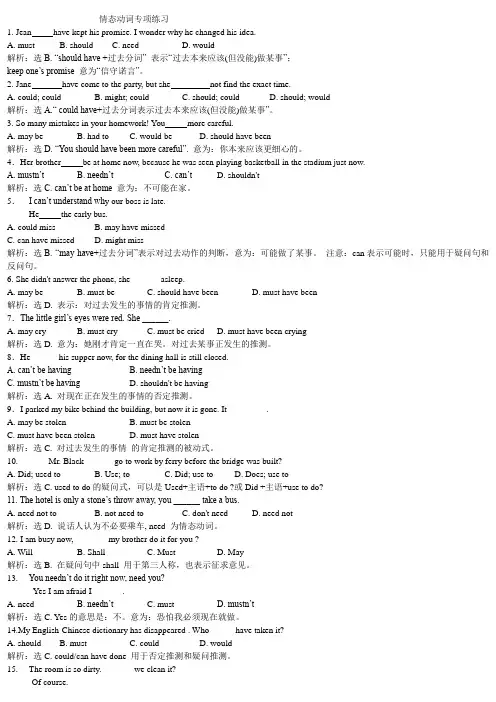
情态动词专项练习1. Jean have kept his promise. I wonder why he changed his idea.A. mustB. shouldC. needD. would解析:选B. “should have +过去分词” 表示“过去本来应该(但没能)做某事”;keep one’s promise 意为“信守诺言”。
2. Jane have come to the party, but she not find the exact time.A. could; couldB. might; couldC. should; couldD. should; would解析:选A.“ could have+过去分词表示过去本来应该(但没能)做某事”。
3. So many mistakes in your homework! You more careful.A. may beB. had toC. would beD. should have been解析:选D. “You should have been more careful”. 意为:你本来应该更细心的。
4.Her brother be at home now, because he was seen playing basketball in the stadium just now.A. mustn’tB. needn’tC. can’tD. shouldn't解析:选C. can’t be at home 意为:不可能在家。
5.---I can’t understand wh y our boss is late.---He the early bus.A. could missB. may have missedC. can have missedD. might miss解析:选B. “may have+过去分词”表示对过去动作的判断,意为:可能做了某事。
情态动词表推测练习
情态动词表推测练习
1.他不可能走得这么早。
2.我本该想到这一点的。
3.你没有必要提这件事。
4.你一定是误会我了。
5.你本可以帮助我的。
为什么只坐在一旁瞧着?
6.他怎么会知道?会是哪个人告诉她了吗?
7.此时他本该到了的。
8.看看都什么是时候了。
十分钟之前我们就该到剧院了。
9.你当时不必那么匆忙的。
10.你们那时非得把它卖了不可吗?
“情态动词+完成式”的用法:
1. must + have done:用于肯定句,表示推测,意为“一定(已经)……”。
2. can + have done:用于否定句或疑问句,表示推测,意为“可能(已经)……”。
3. could + have done:可用于肯定句、否定句或疑问句,表示推测、责备或遗憾等,意为“可能……”、“本来可以……”、“本来应该……”等。
4. should + have done:可用于肯定句、否定句或疑问句,表示责备或遗憾等,意为“本来应该……”。
5. need + have done:用于否定句或疑问句,用于否定时意为“本来不必”,用于疑问句时意为“有必要……吗”。
6. may + have done:用于肯定句或否定句,表示推测,意为“可能(已经)……”。
7. might + have done:用于肯定句或否定句,表示推测,意为“可能(已经)……(此时 might 可换为 may);另外还可以表示过来可能发生的事结果未发生,意为“本来会……”(此时 might 不能换为 may)。
情态动词表推测
must “一定”,只用于肯定句。
certainty
can’t/couldn’t “不可能”。 can “可能”,用于疑问句。
could “可能”,用于may/might “可能”, 用于肯定句, 语气较弱。 may not/might not “可能不”。
must “一定”,只用于肯定句。
He must/could/may be a ___, because _______. (waiter, monk和尚, drunkman 酒鬼, carrier搬运工, dustman清洁工, bartender调酒师...)
陶虹 (Tao Hong)
Gao Xu
may forgive her husband. The lady _____
certainty
“(按道理)应
can’t/couldn’t “不可能”。 2. The man with glasses can’t该” be the thief. can “可能”,用于疑问句。 3. Can the man with a beard admit it?
could “可能”,用于肯定句或疑问句。 4. The man with glasses could/may/might be the thief. uncertainty may/might “可能”, 用于肯定句, 语气较弱。 5. He may not/might not admit it. may not/might not “可能不”。
1. 情态动词表推测的语气 (Mood) 2. 情态动词表推测的形式 (Form)
I am a thief !!
purse
A. The man with a beard B. The man with glasses C. The man suggesting calling the police
(完整word版)情态动词练习题答案
精选练习情态动词1.You________read that article if you don’t want to.A.haven’t B.can’t C. mustn’t D.needn’t 2.I_______get this done immediately or it will be too late.A. must B.can C.may D.might3.The house is dark;the Browns_________ to bed.A.may go B.should goC.should have gone D. must have gone 4.“That car must have cost a 1ot of money.”“Oh,no,_____.”A.it mustn’t B.it hasn’tC.it doesn’t D.it didn’t5. I _______asleep in the corner,for 1 remember nothing of what happened during the night.A.might fall B. must fallC.must have fallen D. can have fallen 6.I’m feeling sick.I_________so much chocolate.A.needn’t have eaten B. couldn’t have eatenC.mustn’t have eaten D.shouldn’t have eaten7. My wallet is nowhere to be found.I________when 1 was on the bus.A.must have dropped it B.must drop itC. should have dropped it D.ought to have dropped it8.Mr.Green________my letter,otherwise he would have replied before now.A.must have received B.must have failed to receiveC.must receive D. must fail to receive9. You could have done much better yesterday.Why_________?A.didn’t you B.couldn’t youC. hadn’t you D.shouldn’t you10.They have done things they ought_______A.not to do B. not to be doneC.not to have done D.not having done11. You had better__________a doctor as soon as possible.A.seen B.saw C.see D.seeing 12.I believe he__________an accident.otherwise he would have arrived on time.A.would have had B. could have hadC.should have had D.must have had 13.Something must have happened on their way here.Or they_______by now.A.should have arrived B.should arriveC.would have arrived D.would arrive14. “Are you coming ‘to Jeff’s party?”“I’m not sure. I _________ go to the concert instead.”A.must B. would C.should D.might 15.“Will you stay for lunch?”“Sorry.___________.My brother is coming to see me.”A.I mustn’t B. I can’t C.I needn’t D.I won’t 16.“I heard they went skiing in the mountains last winter.”“It __________true because there was little snow there.”A.may not be B.won’t be C.couldn’t be D.mustn’t be 17.“Shall we go skating or stay at home?”“Which __________do yourself?”A.do you rather B. would you ratherC.will you rather D.should you rather 18.I was really anxious about you.You_______home without a word.A.mustn’t leave B.shouldn’t have leftC couldn’t have left D.needn’t leave19.Someone is coming here.Who___________it be?A.will B. shall C.must D.can 20.——May I stop here?——No,you_________.A.mustn’t B. might not C.needn’t D.won’t1—5.DADDC 6—10.DABAC 11—15.CDADB 16—20.CBBDA 练习解析1.本句意为:如果你不想,你……读那篇文章。
(完整版)初中英语情态动词专项练习题
(完整版)初中英语情态动词专项练习题情态动词情态动词是一种本身有一定的词义,但要与动词原形及其被动语态一起使用,给谓语动词增添情态色彩,表示说话人对有关行为或事物的态度和看法,认为其可能、应该或必要等。
情态动词后面加动词原形。
情态动词有四类:①只做情态动词:must,can(could),may(might)……②可做情态动词又可做实义动词:need,will③具有情态动词特征:have(had,has) to,used to,ought to④情态动词表猜测:一肯一否三不定(must一肯,can not一否,may,might,could,三不定。
)注:mustn't代表强烈禁止must 表示主观,have to表示客观。
常用的有:can may could must have use .情态动词无人称和数的变化,情态动词后面跟的动词须用原形,否定式构成是在情态动词后面加"not"。
个别情态动词有现在式和过去式两种形式,过去式用来表达更加客气,委婉的语气,时态性不强,可用于过去,现在或将来。
情态动词属非及物动词,故没有被动语态。
情态动词表推测的用法小结(一)情态动词表推测的三种句式1.在肯定句中一般用must (一定),can,could(可能),might /may(也许,或许)。
e.g:(1)He must/can/may,might know the answer to this question.他一定/可能/也许知道这个问题的答案。
(2)It is cold in the room. They must have turned off the heating.屋里很冷,他们肯定把暖气关了。
2.否定句中用can’t / couldn’t(不可能),may not/mightnot(可能不)。
e.g:(1)It can’t/couldn’t be the headmaster. He has gone to America.这不可能是校长,他去美国了。
- 1、下载文档前请自行甄别文档内容的完整性,平台不提供额外的编辑、内容补充、找答案等附加服务。
- 2、"仅部分预览"的文档,不可在线预览部分如存在完整性等问题,可反馈申请退款(可完整预览的文档不适用该条件!)。
- 3、如文档侵犯您的权益,请联系客服反馈,我们会尽快为您处理(人工客服工作时间:9:00-18:30)。
情态动词表推测专项练习1. Look! The light is out in her room. She ———— to bed already.A. must goB. had to goC.must have goneD.has gone2. We had a wonderful time yesterday. You ———— .Why didn't you come?A. had to comeB.should have comeC.might have comeD.must have come3. ─There were already five people in the car but they managed to take me as well.─ It______ a comfortable journey.A. can't beB. shouldn't beC. mustn't have beenD. couldn't have been4. My sister met him at the Grand Theatre yesterday afternoon, so he ___ your lecture.A. couldn't have attendedB. needn't have attendedC. mustn't have attendedD. shouldn't have attended5. I was really anxious about you. You _____ home without a word.A. mustn't leaveB. Shouldn't have leftC. Couldn't have leftD. needn't leave6. Oh, I’m not feeling well in the stomach,I_____ so much fried chicken just now.A. shouldn’t cutB. mustn’t have eatenC. shouldn’t have eatenD. mustn’t eat7. Mr.White _____ at 8:30 for the meeting, but he didn’t’ show up.A. should have arrivedB. should arriveC. should have had arrivedD. should be arriving8. You ______ be tired - you've only been working for an hour.A. must notB. won' tC. can' tD. may not9. - Isn' t that Ann's husband over there?- No, it _______ be him -I'm sure he doesn't wear glasses.A. can'tB. must notC. won'tD. may not10. There ____ be any difficulty about passing the road test since you have practised a lot in the driving school.A . mustn’t B. shan’t C. shouldn’t D.needn’t11. I was on the highway when this car went past followed by a police car. They______ at lease 150 km an hour.A. should have been doingB. must have been doingC. could have doneD. would have done12. He _____ have completed his work; otherwise, he wouldn’t be enjoying himself by the seaside.A. shouldB. mustC. wouldn’tD. can’t13. ---- The woman biologist stayed in Africa studying wild animals for 13 years before she returned.---- Oh, dear! She _______ a lot of difficulties!A. may go throughB. might go throughC. ought to have gone throughD. must have gone through14. This cake is very sweet. You __________ a lot of sugar in it.A.should put B.could have put C.might put D.must have put15. —Catherine, I have cleaned the room for you.—Thanks. You it. I could manage it myself.A.needn’t do B.needn’t have done C.mustn’t do D.shouldn’t have done 16.—Tom is never late for work. Why is he absent today?—Something ________ to him.A.must happen B.should have happenedC.could have happened D.must have happenedThe Uniqueness of Finger-prints(指纹的唯一性)难度:****词数:266 标准时间:6分钟完成时间:______正确数:______ Every human being has a unique①arrangement of the skin on his fingers and this arrangement is unchangeable. Scientists and experts have proved the uniqueness of finger-prints and discovered that no exactly similar pattern is passed on from parents to children, though nobody knows why this is the case.The ridge structure on a person’s fingers does not change with growth and is not affected by surface injuries. Burns, cuts and other damage to the outer part of the skin will be replaced in time by new one, which bears a reproduction of the original②pattern. It is only when the inner skin is injured that the arrangement will be destroyed. Some criminals make use of this fact to remove their own finger-prints but this is a dangerous and rare step to take.Finger-prints can be made very easily with printer’s ink. They can by recorded easily. With special methods, identification③can be achieved successfully within a short time. Because of the simplicity and economy of this system, finger-prints have often been used as a method of solving criminal case. A suspected man may deny a charge but this may be in vain. His finger-prints can prove who he is even if his appearance has been changed by age or accident.When a suspect leaves finger-prints behind at the scene of a crime, they are difficult to detect with the naked eye. Special techniques are used to “develop” them. Some of the marks found are incomplete but identification is possible if a print of a quarter of an inch square can be obtained. ( ) 1. Scientists and experts have proved that the pattern of a human being’s finger skin ________.A. is similar to his mother’sB. is valuable to himself onlyC. is like that of others with the same type of bloodD. is different from that of all others( ) 2. If your fingers are wounded by knife, fire or other means, the structure of skin will ________.A. be changed partlyB. be replaced by a different oneC. be the same when the wound is recoveredD. become ugly( ) 3. Some criminals remove their own finger-prints by ________.A. using printer’s inkB. injuring the inner skinC. damaging the outer skinD. damaging the colour( ) 4. Finger-prints have often been used as a method of solving criminal case because it ________.A. is complicated but reliableB. is simple and not expensiveC. is expensive but easy to doD. can bring a lot of money。
